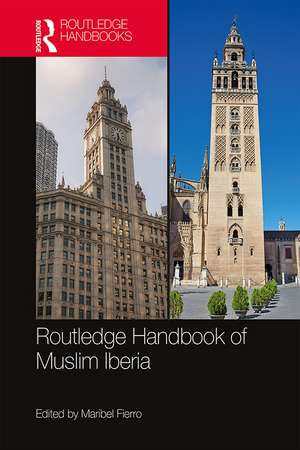The Routledge Handbook of Muslim Iberia
Editat de Maribel Fierroen Limba Engleză Hardback – 30 apr 2020
The contributors are all specialists with diverse backgrounds providing different perspectives and approaches. The volume includes chapters dealing with the destiny of the Muslim population after the Christian conquest and with the posterity of al-Andalus in art, literature and different historiographical traditions. The chapters are organised in the following sections:
- Political history, concentrating on rulers and armies
- Social, religious and economic groups
- Intellectual and cultural developments
- Legacy and memory of al-Andalus
| Toate formatele și edițiile | Preț | Express |
|---|---|---|
| Paperback (1) | 320.99 lei 6-8 săpt. | |
| Taylor & Francis – 13 dec 2021 | 320.99 lei 6-8 săpt. | |
| Hardback (1) | 1578.48 lei 6-8 săpt. | |
| Taylor & Francis – 30 apr 2020 | 1578.48 lei 6-8 săpt. |
Preț: 1578.48 lei
Preț vechi: 1924.97 lei
-18% Nou
Puncte Express: 2368
Preț estimativ în valută:
302.03€ • 315.35$ • 249.98£
302.03€ • 315.35$ • 249.98£
Carte tipărită la comandă
Livrare economică 05-19 aprilie
Preluare comenzi: 021 569.72.76
Specificații
ISBN-13: 9781138649149
ISBN-10: 1138649147
Pagini: 840
Ilustrații: 84
Dimensiuni: 156 x 234 x 51 mm
Greutate: 1.42 kg
Ediția:1
Editura: Taylor & Francis
Colecția Routledge
Locul publicării:Oxford, United Kingdom
ISBN-10: 1138649147
Pagini: 840
Ilustrații: 84
Dimensiuni: 156 x 234 x 51 mm
Greutate: 1.42 kg
Ediția:1
Editura: Taylor & Francis
Colecția Routledge
Locul publicării:Oxford, United Kingdom
Public țintă
Postgraduate and UndergraduateCuprins
Introduction. Maribel Fierro PART I. Rulers 1. The Iberian Peninsula before the Muslim conquest. Iñaki Martín Viso 2. The conquerors and the formation of al-Andalus. Jesús Lorenzo 3. Centralization and consolidation. The Cordoban Umayyads and the Amirids. Xavier Ballestin 4. Replication and fragmentation. The Taifa kingdoms. Alejandro García Sanjuán 5. Berber rule and Abbasid legitimacy. The Almoravids. Camilo Gomez-Rivas 6. Berber rule and the Maghribi caliphate. The Almohads. Pascal Buresi 7. Resistance and adaptation. The Nasrids. Francisco Vidal-Castro 8. The coins of al-Andalus. Ideological evolution and historical context. Tawfiq Ibrahim and Ruth Pliego PART 2. Society 9. Arabs, Berbers, and local converts. Jessica Coope 10. Christians, Jews, and the dhimma status. David J. Wasserstein 11. Women and slaves. Manuela Marin 12. Traders and peasants. Pierre Guichard 13. Secretaries and the running of government. Bruna Soravia 14. Scholars, jurists, and the legal system. Maribel Fierro 15. Ascetics and Sufis. José Bellver PART 3. Culture 16. Poetry and literature. Teresa Garulo 17. Religious sciences. Camilla Adang 18. Historiography and geography. Víctor de Castro León 19. Philosophy. Sarah Stroumsa 20. Sciences and technology. Mònica Rius-Piniés 21. Art and architecture. Susana Calvo Capilla 22. Material culture. José C. Carvajal López 23. Daily life and popular culture. Alejandro García Sanjuán PART 4. The aftermath of al-Andalus 24. Living as Muslims under Christian rule. The Mudejars. Filomena Barros 25. The forced conversions and the Moriscos. Mayte Green-Mercado 26. The integration of al-Andalus in Islamic historiography. The view from the Maghrib and the Mashriq. Luis Molina 27. The memory of al-Andalus in early modern Spain. Fernando Rodríguez Mediano 28. Writing on al-Andalus in the modern Islamic world. Christina Civantos 29. Writing the history of al-Andalus. Spain and the West. Alejandro García Sanjuán 30. The Alhambra around the world. Images and constructions of an aesthetic paradigm of modernity. José Miguel Puerta Vílchez 31. The politics and aesthetics of Convivencia. Manuela Ceballos
Notă biografică
Maribel Fierro is a research professor at the Consejo Superior de Investigaciones Científicas (Instituto de Lenguas y Culturas del Mediterráneo-CSIC), Spain. Her research focuses on the political, religious and intellectual history of al-Andalus and the Maghreb, Islamic law, the construction of orthodoxy and the persecution of heresies, and violence and its representation in Medieval Arabic sources. Among her publications: The Almohad Revolution. Politics and religion in the Islamic West during the twelfth–thirteenth centuries (2012), and Abd al-Rahman III: The first Cordoban caliph (2005). She has been the recipient of the Anneliese Maier Award 2014 of the Alexander von Humboldt Foundation.
Recenzii
"The Routledge Handbook of Muslim Iberia is a collection of essays written by thirty authors and serves as a guide to al-Andalus, defined geographically as the territory in the Iberian peninsula under Islamic rule between 711 and 1492. The volume also includes North African kingdoms that ruled over Iberian territories, and Andalusi populations and their descendants who came under the authority of Iberian Christian rulers beginning in the late eleventh century. The Handbook is directed toward both nonspecialist readers interested in exploring aspects of the Andalusi past, including poetry, art, and architecture, and researchers interested in an introduction to the themes of current and past scholarship and the main written and material sources for studying aspects of the politics, society, and culture of al-Andalus.
"[The book] is designed to be picked up for reference and encourage further exploration of topics and themes in Andalusi history. The chapters are well conceived and authoritative. The book may also be read from beginning to end for an effective, multivocal overview of what scholars ask and think about al-Andalus."
Janina Safran, Journal of the American Oriental Society 143.4 (2023)
"[The book] is designed to be picked up for reference and encourage further exploration of topics and themes in Andalusi history. The chapters are well conceived and authoritative. The book may also be read from beginning to end for an effective, multivocal overview of what scholars ask and think about al-Andalus."
Janina Safran, Journal of the American Oriental Society 143.4 (2023)
Descriere
This handbook offers an overview of the main issues regarding the political, economic, social, religious, intellectual and artistic history of the Iberian Peninsula during the period of Muslim rule (8th-15th centuries).
